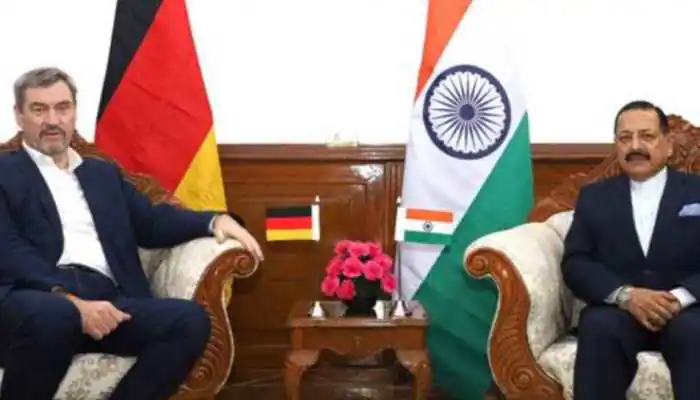During a high-level meeting on Sunday, Union Minister Jitendra Singh and Minister-President of the German State of Bavaria Markus Soder reaffirmed their commitment to strengthening bilateral cooperation in research, technology, and innovation.
The two leaders met one-on-one before engaging in high-level delegation-level discussions headed by the two Ministers.
Dr. Jitendra Singh welcomed the German group and underlined the potential for bilateral cooperation in important areas such as artificial intelligence, quantum technologies, biotechnology, clean energy, electric mobility, cyber-physical systems, and green hydrogen.
“India has embarked on mission-mode programmes under the visionary leadership of Prime Minister Narendra Modi. We seek economic and sustainable solutions through scientific and technological interventions, and Germany is a natural partner in this endeavour,” Minister of State (independent charge) for Science and Technology Jitendra Singh said.
He applauded the Indo-German 2+2 collaboration model involving joint efforts between academia and industry from both countries, calling it a landmark step toward creating future-ready, innovation-driven ecosystems.
“The 2+2 collaboration is a futuristic model. It brings together universities and industries from both countries to solve global challenges through innovation, co-development, and commercialization,” the minister said.
Singh emphasized India’s outstanding success in the biotech sector, which has over 3000 businesses and leads the world as the largest vaccine manufacturer. He emphasized the importance of the recently established BIOe3 policy, which focuses on energy, economy, and employment to propel the next generation of biotech innovation.
He discussed India’s growth as a biotech powerhouse, with over 3000 startups and the recent establishment of the BIOe3 program, which aims to drive energy, economy, and employment through biotech innovation.
The Science and Technology Minister remarked that India’s Space-Tech and Nuclear sectors, which are now open to private investors, provide enormous cooperation prospects. He went on to say that India is ranked third in the world for startups and unicorns, making it a thriving destination for IT alliances.
“India’s academic outreach to Germany continues to deepen, with over 50,000 Indian students enrolled in German universities—mostly in STEM disciplines—a number that has tripled in the last seven years”, Jitendra Singh said.
He called for a reciprocal increase in German students studying in India, particularly in the areas of Oriental Studies, Indian Culture, and Traditional Knowledge Systems.
“Germany has emerged as a favoured academic destination for Indian youth. Now we hope to see more German students exploring India’s intellectual heritage and scientific capabilities,” he said.
Dr. Markus Soder, German Ambassador to India, was joined by Dr. Philipp Ackermann and other senior delegates from Germany. Dr. Abhay Karandikar, Secretary, Department of Science and Technology (DST); Dr. Praveen Somasundaram, Head of International Cooperation; and Dr. Alka Sharma, Senior Advisor, Department of Biotechnology, represented India at the meeting.
Source: IANS







 Finance
Finance







